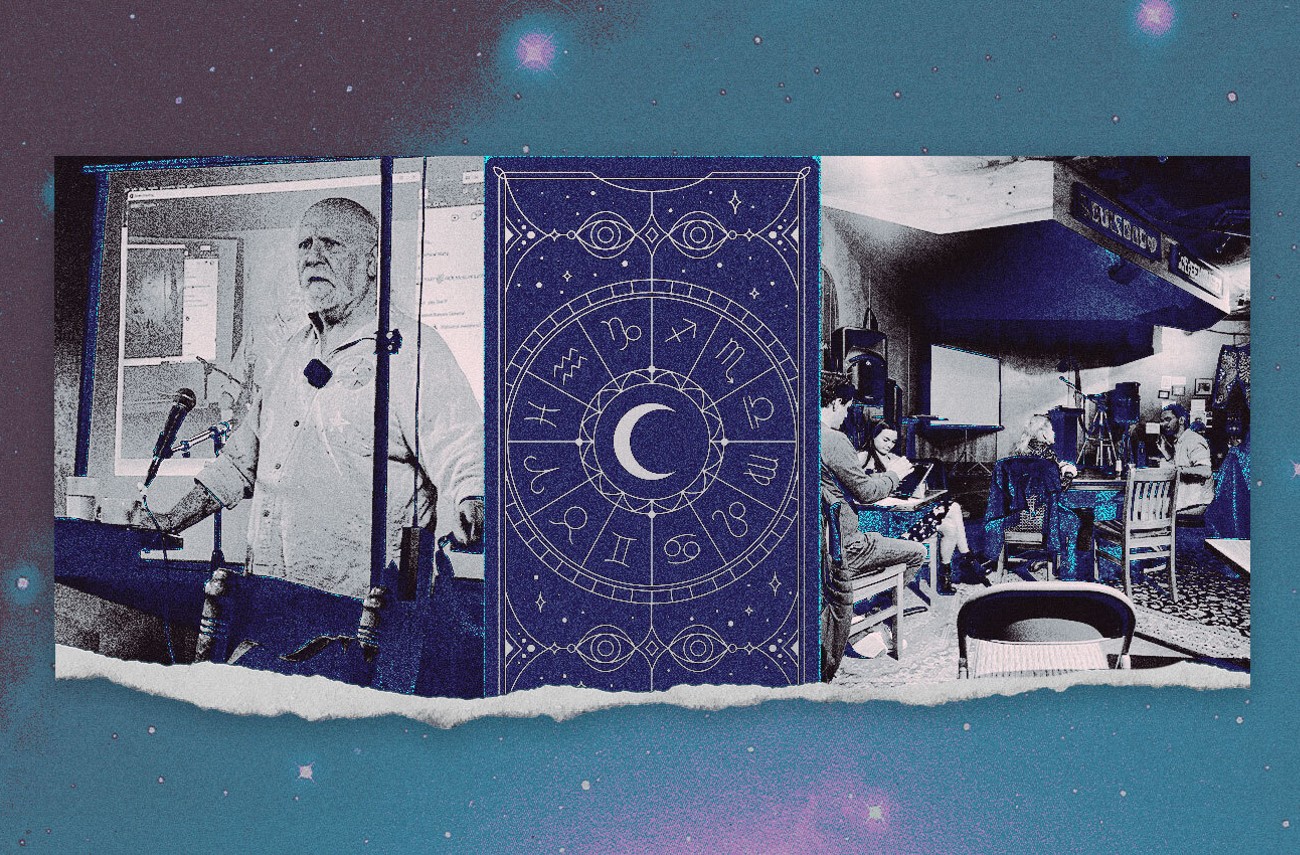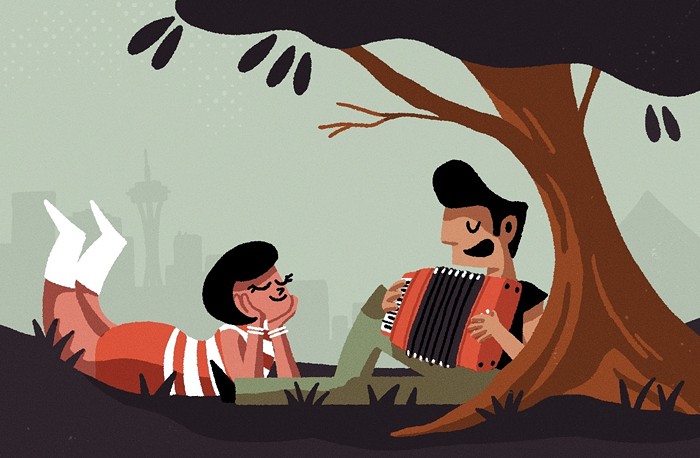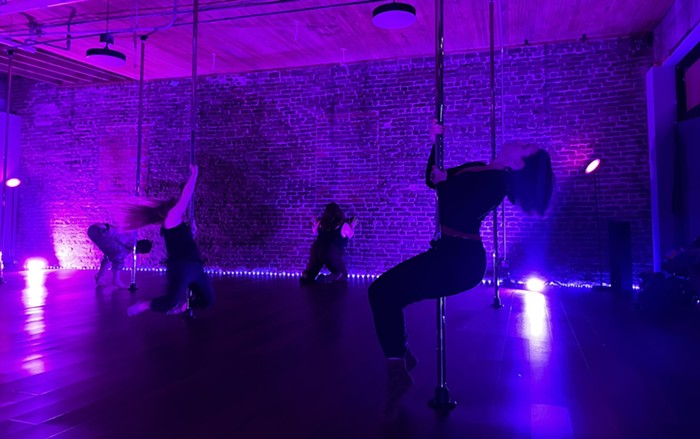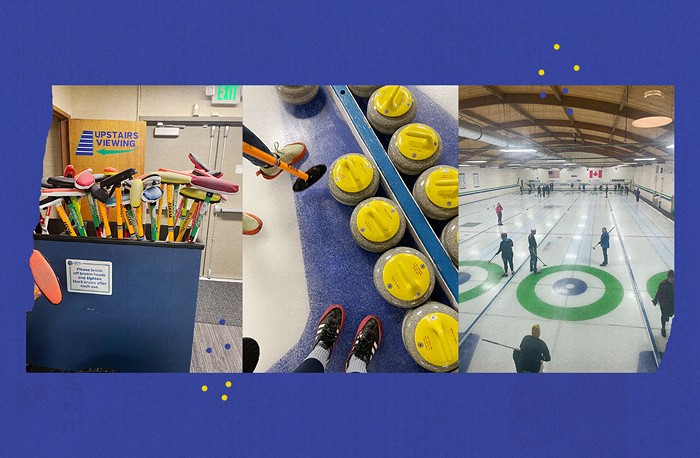Last September, while walking around Green Lake, I stumbled across an astrologer sitting on the grass offering birth chart readings.
I’ve never had my chart read, but I am someone who walks a little slower when I come across psychic shops, looking back over my shoulder when I pass by them. I’ve had my palm read twice—once by a magician at my step dad’s birthday party, once in a Hell’s Kitchen apartment amidst half-folded stacks of laundry—and I love to hear myself explained.
I sat down on Aubergine Bliss’s blanket. She smoothed her cornflower blue dress and knelt beside me as she plugged in my birth date, location, and time into an app on her phone. (Not CoStar because, “We don’t love CoStar,” she said.)
Bliss, an Aquarius, is a full-time astrologer in Seattle. While she generally works alone, she regularly interfaces with the vibrant astrologer community in the Seattle area.
Bliss told me what was what in my life as a Pisces sun, Sagittarius moon, and Capricorn rising, where the sun is my essence, the moon is how my emotions operate, and the rising is how I appear to the world. Because of Bliss and the reading she gave me all those months ago, I looked to the stars and to Seattle’s astrologer community for my latest exploration into Seattle hobbies and subcultures.
But first, that reading.
The Reading
First, she told me about how, at 27, I’m in the thick of my first Saturn Return, a period of growth and change and becoming, when Saturn re-enters the place it held when I was born—an event everyone goes through roughly every 29 years. The first one, at 29, signifies the true entry point of adulthood. This will be when all the things I’ve been working toward pay off, she explained. Okay, shit, no pressure.
“You have such a crazy chart,” Bliss said, sitting cross-legged on that blanket. Then, again, in a whisper to herself, “You have such a crazy chart.” A beat. “You’re the fucking grim reaper.”
Excuse me, what?
“You’re a finisher,” she said.
I thought of all the half-finished projects I’d yet to complete, the ideas growing stale and unacted upon in my mind, and of my life made up of unfulfilled “I wills” and “I shoulds.” I wasn’t so sure about that, I told her.
Whatever that instinct is to “do,” it’s in me, but it’s clouded, she said. What’s stopping me from doing?
Fear, probably, I said.
“You care a lot,” she mused. “You would be horrified if people knew how much you cared.”
I thought of distant dreams, things I’m afraid to put into words, to type. “I want to be a lot of things.”
“So, you have to do what you care about,” Bliss said.
I told her about this column. Then, she invited me with her to Redmond. She was leaving in 10 minutes to go to a monthly astrology meet-up hosted by one of the best astrologers in the region at a coffeehouse. I hemmed and hawed. It was Labor Day weekend. Wouldn’t there be traffic?
“If you want to start doing, now is the time,” she said.
And so I went to SoulFood Coffeehouse to hear about the astrology outlook for September. That’s where I met Rick Levine, discovered Seattle’s rich astrology history, and learned a bit more about myself.
The Wizard’s Apartment
Rick Levine, Aries, is in his 70s. He spoke for over two hours at SoulFood that September night, wearing an off-white button-up adorned with hand-painted stars, comets, and planets. People in the audience watched, nodding their heads and scribbling notes as he talked about planets in retrograde. I left at the short intermission, tired and sweaty and not feeling so chatty, my impulsivity fading.
To learn more about the local astrology scene, months later in January I walked across a doormat with a faded ram on it and into Levine’s apartment mere blocks away from SoulFood.
Inside, incense wafted. Soft piano music played. Mobiles of stars dangled from the ceiling. Bookshelves full of books such as Discover the Stars, Cosmos and the Psyche, the complete Merlin series, Music, Mind, and Brain, and too many astronomy books to count lined the walls. A basket full of flutes sat in a corner. Persian rugs of different colors and designs covered the already-carpeted floor in a patchwork. Table cloths of moons, stars, and planets cloaked most flat surfaces.
Levine invited me to sit on a recliner and urged me to pop open the chair’s footrest to make myself comfortable. I did. He lounged on the couch across from me. As we talked, his body sank lower and lower into the couch until his shoulders consumed his neck.
Growing up, he found he liked weird, forbidden things.
“Anything that didn’t fit into the paradigm, that’s where I was,” he said. He read Freud as a fourth grader. “I always felt there was more going on than I was being told, and I wanted to know what it was.”
He learned hypnotism from a book as a junior in high school.
“No party was complete until I hypnotized the football quarterback or the prom queen and made them eat an onion making them think it was an apple,” he said. (He doesn’t use that type of hypnotism anymore, he said, calling it offensive.)
He boiled his 1960s era college experience down to “sex, drugs, rock n’ roll, and astrology.” While studying psychology—specifically Carl Jung—he read a book called The Astrology of Personality by Dane Rudhyar.
“It changed my life because I realized that astrology wasn’t just some cool parlor game that you can guess about people and figure out stuff,” Levine said. “Somehow, it was one of the main underpinnings of Western Civilization. I was like, ‘What the fuck?’ They don’t teach you that.”
From that point forward, Levine became an astrologer. He’s been practicing for around 50 years. He was the president of the Washington State Astrologer’s Association for a spell, a founding trustee of local Kepler College, which used to offer a bachelor of arts in astrology, and has contributed chapters to many astrology books.
But, what is astrology?
Art, Science, a Map, a Tool in the Face of Alterable Fate
For Levine, astrology is music and math. It’s both art and science. In an extended metaphor about the brain, astrology is the corpus callosum, the fleshy bridge between the brain’s lobes, “because what it does is connect time and space,” Levine said.
Above all, astrology is a map, he said.
“The map doesn’t tell you where you’re going. The map tells you the lay of the land. It tells you where you need to make decisions to get to where you’re going,” he said. “I’m not interested in predicting your future, I can’t tell you where you’re going to go, but I can tell you when the intersections are going to happen. I can tell you the results of the choices you might make, but I can't make those choices for you.”
The Greeks believed in three levels of fate, Levine explained in very Jungian terms.
On the first level, or heimarmene, are the things that are inalterable; they are conditions that no intervention will change, like living in a body that will one day die. The second level is agnoia, which means “without knowing.” This is a fate which is not inevitable, like driving off a cliff because you didn’t know a cliff was there, Levine said. The last level is pronoia, which, Levine said, is “being ready for the right moment and doing something with it.” Pronoia is forethought, care, or provision. Jung called it "an antidote to paranoia." Levine likens it to being prepared, and astrology “is a tool to increase one’s ability to practice pronoia,” he said.
This framework is not widely understood.
“People don’t get it,” Levine said. “Astrology probably has a more serious PR problem than Joe Biden—and I’m not suggesting anyone should vote for him. And I’m suggesting someone should vote for a piece of granite before they vote for Trump.”
(Levine does not believe any astrologer can predict what’s going to happen in the presidential election this year. Though, he has a weird non-astrology-based feeling that neither Biden nor Trump will win.)
With all of this data, I attended the first Astrology Night of the year on the first Friday of February. (Levine was on a six-week retreat in India during January).
The Northwest Rite of Astrological Passage
Seattle is a big name in the astrological world largely because of the Northwest Astrological Conference, or NORWAC, which is held every year over Memorial Day weekend. Maggie Nalbandian, Aries, owner of Astrology Et Al, a one-time staple on “The Ave” next to the University of Washington, started the conference 40 years ago. Both the shop and the conference became renowned and put Seattle on the map for all things astrology, spawning a community of astrologers, Levine said. Astrology Night holds a similar prominence.
“In the astrology world, SoulFood is a legendary place,” he said.
Levine first started doing Astrology Night with his friend Jeff Jawer, Taurus, when SoulFood coffeehouse first opened, around “2001 or 2002,” Levine said. Levine and Jawer hosted the event on the first Friday of every month.
“The two of us did it for 10 or 12 years before he checked out,” Levine said. About eight years ago, Jawer died of lung cancer. “I’ve been doing it on my own ever since.”
People come from all over to Astrology Night. Levine said he’s had people from as far away as Iceland and Australia who have made the pilgrimage to SoulFood. One family from Salt Lake City, Utah flew to Seattle specifically to drive to Redmond and attend Astrology Night, he said.
“The goal is to spread the word,” he said. “It’s evangelism. It’s to create community.”
At Astrology Night
SoulFood brimmed with people last Friday, everybody there to listen to Levin talk about the astrological outlook for February and 2024.
According to Levine, the practice of astrology is growing. It’s a “hyperbolic trajectory” that hasn’t slowed down since the ‘60s, but in the last 15 years, because of the internet, it’s exploded.
Nicholas Polimenakos, Gemini, started practicing astrology almost 30 years ago.
“I met some girl living on Summit Avenue on Capitol Hill who got me into it,” he said in a voice reminiscent of Fred Armisen.
By 2009, he'd become a full-blown professional astrologer. He’s seen the local scene grow and change.
“There was a period of time where generations of astrologers were wondering where all the young astrologers were,” he said. Then, around 2019, “something changed with social media” and “everything blew up.”
The pandemic magnified that explosion.
“There’s a huge amount of people that jumped into studying astrology because they had nothing else to do [during the pandemic],” Polimenakos said.
Wayne Arthur, Aries, was one of the pandemic-born astrologers. From Brooklyn, New York, Arthur is an opera singer. He’s in town as part of the ensemble for the Seattle Opera’s showing of X: The Life and Times of Malcom X. When speaking with the Seattle Opera’s manager, he mentioned astrology. She was coming to Astrology Night and invited him. He joined her. He blames the impulsivity on his Sagitarrius moon and Sagitarrius rising signs.
“This is our first time hanging out,” he said. He thought she might have some Scorpio in her chart.
For Arthur, learning about astrology—specifically the transits of the planets—is clarifying.
“It’s a really useful tool for not just understanding yourself, but other people,” he said.
Tucked into a table pushed up against the wall of the cafe sat Anastasia Anderson, Aries. She started practicing astrology five years ago. She moved to Washington from the Midwest last summer and opened up her own shop, Elaheh Divination & Healing. She originally met Levine at NORWAC and started coming to Astrology Night as soon as she moved here.
Anderson now uses astrology in her everyday life. For instance, she’ll consult a chart about where to vacation—a branch of the discipline known as astrocartography.
“I went to Florida because I had a Jupiter line going through Florida,” Anderson said. A Jupiter line is a good thing, I gathered. “I went with my mom, unfortunately. She has a Uranus line going through there, so she actually lost her wallet. But, we were able to use astrology to find her wallet and she got it back within 24 hours.”
There are over 80 branches of astrology. Horary astrology, Anderson explained, deals with burning questions.
“You cast a chart for the moment you have a question,” she said. “The moment we knew her wallet was lost, we cast a chart and it could tell me the direction from where we were that her wallet was, how long it would be until she was able to find it, whether or not someone had stolen money out of it, and all of that.”
As Levine spoke to the room, Polimenakos looked up my chart. He’d guessed my birth time after hearing of my Capricorn rising sign. Impressive. He held his phone with fingers poking out of colorful, fingerless knit gloves.
He mused in whispers about my rising sign and how, if my birth certificate was two minutes off, I could have been a Sagittarius rising. The rising sign is a big, finicky deal because, as the sign that was on the eastern horizon when you were born, it changes often.
The astrological community has a whole rating system for birth times, where “AA” signifies verification via birth certificate and anything below that is considered hearsay, Polimenakos said.
“Part of our industry is going to states and countries and trying to get birth certificates of famous people,” Polimenakos said. “Each state and country is different.”
He really wants to get GOP presidential candidate Nikki Haley’s birth time. He also wants Taylor Swift and her new-beau Travis Kelce’s times to see if they’re meant to be.
“Hillary Clinton we’ve been trying to get for years,” Polimenakos said. “There are people out there where that’s their whole game.”
For Polimenakos, astrology is all about meaning.
“It’s all about finding one’s self and connection to self,” he said. “You’re getting external confirmation from the universe. It all comes down to myth and meaning, and that’s how humans run.”
Singer-songwriter Ryell Carley, Capricorn, started studying astrology around three years ago when she entered her Saturn return.
“It’s given me permission to be myself,” she said. “We’re all so unique and different, and astrology is a language and a tool and a lens to see our lives through.”
That took me back to a moment in Levine’s living room when he took a look at my chart. He saw a lot of the same things Bliss did.
My Map
It turns out I’m being pushed and pulled by opposing forces thanks to the interplay of Mars and Saturn sandwiching my sun, Levine explained. Noted.
“You’re in the middle with the gas pedal on one side and the brake on the other side,” he said. “You go through life trying to work that gas and brake.”
Sometimes I hit the brake too hard and don’t go anywhere. Sometimes I try to hit the gas, but hit the brake instead. I know the feeling.
“There’s this dance of yes/no. Don’t do it/do it. Stop/accelerate. Slow down—whatever,” he said.
"But, I think that is the primary conflict in your chart.”
Yes, that's exactly it. A particular malaise of mine comes from wanting to act, then being so bogged down in details—in whats and ifs—that I stand still. He’d read me right. Hearing it was nice in a way, like confirmation of a truth Bliss started to tell me back in the fall. It was clarity and reinforcement. And also, it was depressing. Would it always be like this?
“The good news is that spirituality—and when I say spirituality I mean whatever it is that you feel when your music is playing—not physical music, but it could be that—that’s the piece that gets you out from under the thumb of Saturn," Levine said. "Somehow, there’s a part of you that’s tuned in to a higher whatever that I think is important.”
I didn’t know what my music was. Writing, the thing I avoid even though I know I feel better once I've done it? Maybe. Reading? Perhaps. Watching movies that make me cry? That's a type of spirituality, surely. I pondered it while Levine pulled out a flute he got from India and played a ditty. I think I’ll keep pondering it all until the planets stop moving their way through my chart.
Any ideas on which Seattle subculture I should explore next? Want me to tag along with you on your favorite hobby or pastime? Send me tips at playdate@thestranger.com.




















